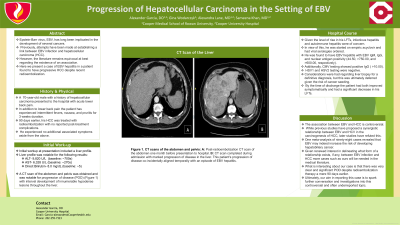Monday Poster Session
Category: Liver
P2467 - Progression of Hepatocellular Carcinoma in the Setting of EBV Hepatitis: Coincidence or Something More?
Monday, October 23, 2023
10:30 AM - 4:15 PM PT
Location: Exhibit Hall

Has Audio

Alexander Garcia, DO
Cooper University Hospital
Camden, NJ
Presenting Author(s)
Alexander Garcia, DO1, Gina Wodarczyk, BS2, Alexandra Lane, MD1, Sameena Khan, MD1
1Cooper University Hospital, Camden, NJ; 2Cooper Medical School of Rowan University, Camden, NJ
Introduction: EBV has long been implicated in the development of several cancers. Previously, attempts have been made at establishing a link between EBV infection and hepatocellular carcinoma (HCC), however, the literature remains equivocal at best regarding the existence of an association. Here we present a case of EBV hepatitis in a patient found to have progressive HCC despite recent radioembolization.
Case Description/Methods: A 70-year-old male with a history of hepatocellular carcinoma presented to the hospital with acute lower back pain in the setting of intermittent fevers, nausea, and pruritis for 3 weeks. Vitals were unremarkable and a physical exam was revealing for scleral icterus and scattered ecchymosis. LFTs were notable for an AST of 6,328 U/L (baseline:273), ALT of 9,820 U/L (baseline:714), and total bilirubin of 8.0 mg/dL (baseline: 5.7). Both CT abdomen and MRI liver revealed evidence of progression of disease (POD) with interval development of innumerable hypodense lesions throughout the liver. Given the level of rise in his LFTs, infectious hepatitis and autoimmune hepatitis were of concern. In view of this, he was started on empiric acyclovir and had viral serologies ordered. He was found to have EBV hepatitis with EBV IgM, IgG, and nuclear antigen positivity (44.50, >750.00, and >600.00, respectively). Additionally, CMV testing showed positive IgG ( >10.00) with negative HSV1 and HSV2 testing. Considerations were had regarding liver biopsy for a definitive diagnosis, but this was ultimately deferred given the risk of cancer seeding. By the time of discharge the patient had both improved symptomatically and had a significant decrease in his LFTs.
Discussion: The association between EBV and HCC is controversial. While previous studies have proposed a synergistic relationship between EBV and HCV in the carcinogenesis of HCC, later studies have refuted this. One meta-analysis of ninety-eight cases revealed that EBV may indeed increase the risk of developing hepatobiliary cancer. Given renewed interest in delineating what form of a relationship exists, if any, between EBV infection and HCC more cases such as ours will be needed in the medical literature. What is interesting about our case is that there was very clear and significant POD despite radioembolization therapy a mere 90 days earlier. Ultimately, our aim in reporting this case is to spark further conversation and investigations into this controversial and often underreported topic.

Disclosures:
Alexander Garcia, DO1, Gina Wodarczyk, BS2, Alexandra Lane, MD1, Sameena Khan, MD1. P2467 - Progression of Hepatocellular Carcinoma in the Setting of EBV Hepatitis: Coincidence or Something More?, ACG 2023 Annual Scientific Meeting Abstracts. Vancouver, BC, Canada: American College of Gastroenterology.
1Cooper University Hospital, Camden, NJ; 2Cooper Medical School of Rowan University, Camden, NJ
Introduction: EBV has long been implicated in the development of several cancers. Previously, attempts have been made at establishing a link between EBV infection and hepatocellular carcinoma (HCC), however, the literature remains equivocal at best regarding the existence of an association. Here we present a case of EBV hepatitis in a patient found to have progressive HCC despite recent radioembolization.
Case Description/Methods: A 70-year-old male with a history of hepatocellular carcinoma presented to the hospital with acute lower back pain in the setting of intermittent fevers, nausea, and pruritis for 3 weeks. Vitals were unremarkable and a physical exam was revealing for scleral icterus and scattered ecchymosis. LFTs were notable for an AST of 6,328 U/L (baseline:273), ALT of 9,820 U/L (baseline:714), and total bilirubin of 8.0 mg/dL (baseline: 5.7). Both CT abdomen and MRI liver revealed evidence of progression of disease (POD) with interval development of innumerable hypodense lesions throughout the liver. Given the level of rise in his LFTs, infectious hepatitis and autoimmune hepatitis were of concern. In view of this, he was started on empiric acyclovir and had viral serologies ordered. He was found to have EBV hepatitis with EBV IgM, IgG, and nuclear antigen positivity (44.50, >750.00, and >600.00, respectively). Additionally, CMV testing showed positive IgG ( >10.00) with negative HSV1 and HSV2 testing. Considerations were had regarding liver biopsy for a definitive diagnosis, but this was ultimately deferred given the risk of cancer seeding. By the time of discharge the patient had both improved symptomatically and had a significant decrease in his LFTs.
Discussion: The association between EBV and HCC is controversial. While previous studies have proposed a synergistic relationship between EBV and HCV in the carcinogenesis of HCC, later studies have refuted this. One meta-analysis of ninety-eight cases revealed that EBV may indeed increase the risk of developing hepatobiliary cancer. Given renewed interest in delineating what form of a relationship exists, if any, between EBV infection and HCC more cases such as ours will be needed in the medical literature. What is interesting about our case is that there was very clear and significant POD despite radioembolization therapy a mere 90 days earlier. Ultimately, our aim in reporting this case is to spark further conversation and investigations into this controversial and often underreported topic.

Figure: Post-radioembolization CT scan of the abdomen, one month before presentation to hospital (A). CT scan completed during admission with marked progression of disease in the liver (B). This patient's progression of disease co-incidentally aligned temporally with an episode of EBV hepatitis.
Disclosures:
Alexander Garcia indicated no relevant financial relationships.
Gina Wodarczyk indicated no relevant financial relationships.
Alexandra Lane indicated no relevant financial relationships.
Sameena Khan indicated no relevant financial relationships.
Alexander Garcia, DO1, Gina Wodarczyk, BS2, Alexandra Lane, MD1, Sameena Khan, MD1. P2467 - Progression of Hepatocellular Carcinoma in the Setting of EBV Hepatitis: Coincidence or Something More?, ACG 2023 Annual Scientific Meeting Abstracts. Vancouver, BC, Canada: American College of Gastroenterology.
